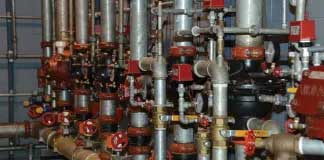ASSE International is getting more involved with the fire protection industry through the professional qualifications standards we develop and the personnel certification programs we administer. Of course, ASSE has been involved in fire protection systems for many years because these systems require backflow protection. The backflow assemblies on fire protection systems are tested by trained and certified backflow testers, many of whom have the ASSE 5110 Backflow Prevention Assembly Tester Certification. Fire sprinkler systems are life safety systems and cannot be taken offline for an extended time. Therefore, many backflow testers who work on fire protection systems also have the ASSE 5130 Backflow Prevention Assembly Repairer Certification.
The first fire protection standard that ASSE developed was the Series 7000, Residential Potable Water Fire Sprinkler System Installers and Inspectors for One- and Two-Family Dwellings. The Installer standard (7010) provides the minimum performance criteria for installers who provide layout, detail, calculations, and installation for residential potable water fire sprinkler systems. The Inspector standard (7020) applies to individuals who inspect residential potable water fire sprinkler systems. These standards apply to residential fire sprinkler systems in one- and two-family dwellings, as identified in NFPA 13D, Standard for the Installation of Sprinkler Systems in One- and Two-Family Dwellings and Manufactured Homes, and other internationally recognized codes. Individuals certified to ASSE 7010 and 7020 must recertify every three years. The ASSE Series 7000 standard was recently revised in June 2020.
Also revised in 2020 was the ASSE Series 15000, Professional Qualifications Standard for the Inspection, Testing and Maintenance of Water-Based Fire Protection Systems. The 2020 revision includes clarification of inspection and sample testing of sprinklers; the addition of NFPA 11, Standard for Low-, Medium-, and High-Expansion Foam, and NFPA 22, Standard for Water Tanks for Private Fire Protection, to the list of knowledge requirements of ASSE 15010 certification; and the inclusion of remotely monitored, automated inspection and testing. The ASSE 15010 Water-Based Fire Protection Certification already required having knowledge of NFPA 13, Standard for the Installation of Sprinkler Systems, NFPA 14, Standard for the Installation of Standpipe and Hose Systems, NFPA 20, Standard for the Installation of Stationary Pumps for Fire Protection, and NFPA 25, Standard for the Inspection, Testing, and Maintenance of Water-Based Fire Protection Systems.
Inspection, testing, and maintenance (ITM) of these fire protection systems is critical in protecting occupants, facilities, and property. People certified to the ASSE 15010 standard have demonstrated their knowledge, skills, and experience in ITM on fire protection systems, including dry-pipe systems, preaction systems, main drain tests, alarms, and fire pumps. Their skills and expertise protect you and I from potentially deadly fires. What separates the ASSE 15010 certification from other certifications is that the 15010 goes beyond the requirements of NFPA 25. A person certified to ASSE 15010 has the qualifications to perform evaluations of fire protection systems for conformance to codes and standards and determine if sprinkler systems are adequate based on building evaluations and uses (in consultation with a licensed engineer in some states), which is beyond the scope of NFPA 25. Check out the article in this issue of Working Pressure, written by Shawn Arballo, for more information on fire protection ITM.
ASSE is now embarking on the development of a new fire protection professional qualifications standard, which will provide minimum performance criteria for people who work on hybrid extinguishing systems, as defined by NFPA 770-2021, Standard on Hybrid (Water and Inert Gas) Fire Extinguishing Systems. NFPA 770 is a new standard that addresses the very specialized requirements of these hybrid systems. The new ASSE standard, Series 27000, will address the qualifications of the designers, installers, and ITM personnel who work on these specialized systems. Jack Carbone has written a great article in this issue of explaining much more about these hybrid fire extinguishing systems and what people need to know in order to work on them.
Once again, training and certification are the key elements in having qualified individuals protecting occupants and facilities. That recurring theme is seen across every aspect of the plumbing and mechanical industry. New products and new systems are being developed all the time, and new thought processes on existing products and systems also need to be explored. I encourage all of us to be life-long learners. Never stop learning.
Article by Marianne Waickman first appeared in ASSE’s Working Pressure magazine
Last modified: May 10, 2021

